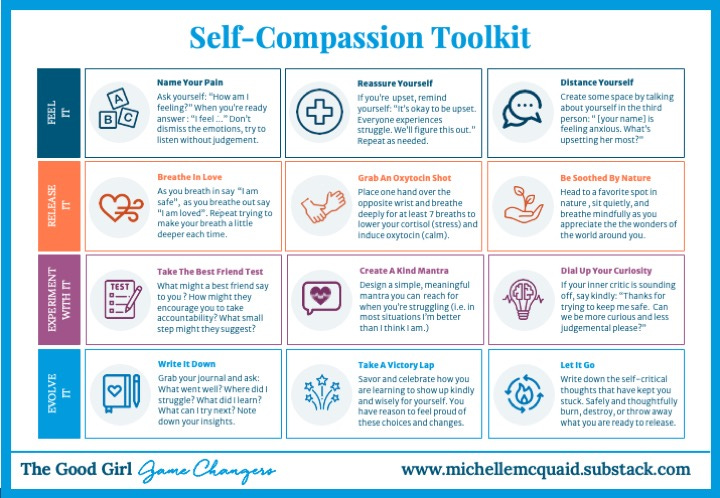Do you need a self-compassion toolkit?
GRAB THE TOOLKIT: Break free of the need to perform perfectly
It was the kindest thing anyone had ever said to me.
“What’s the worst thing people will discover about you?” asked the wise professor. “That sometimes you struggle because you’re still learning. Welcome to the human race.”
The pressure to be perfect slipped from my shoulders as her words settled into my skin.
Until that moment, I had spent most of my life hustling hard to present a shiny, smooth, effortless version of my best self to the world, hoping that my greatest fear would not be uncovered... that I was not good enough.
Not good enough to succeed. Not good enough to be liked. Not good enough to be loved.
By the time I spoke to the professor, I was in my late 30s and utterly exhausted.
If only I'd known sooner that nature wired every single one of us to be perfectly imperfect.
I vowed from that moment there would be no more striving.
But I was in desperate need of new tools to help me calm the voice of my inner mean girl who had spent years verbally whipping me into a frenzy of perfection.
Fortunately, around this time I stumbled onto the research and tools of self-compassion.
Dr. Kristin Neff explains that the three core elements of self-compassion – kindness, connectedness, and perspective – help us to see that our voices of self-criticism aren’t trying to harm us, but are a misguided effort to protect us. Instead of taming, shaming or blaming these voices for undermining our confidence, self-compassion has been found to help reduce our levels of stress, anxiety, and self-doubt by allowing us to see them for what they are – just stories about the things we fear and not the truth about who we are or what we’re capable of.
Kristin’s insights taught me how to speak to myself like my wisest and kindest friend.
As a result, studies have found that self-compassion helps activate our brain’s care-giving and self-awareness systems making it easier to believe we are capable and worthy, making us less self-conscience, less likely to compare ourselves to others, and less likely to feel insecure. And far from being self-indulgent or “soft” the deliberate use of self-compassionate talk is an effective means of enhancing our motivation, our performance, and our resilience.
This may explain, why our research has found that self-compassion was the tool most often used by women to break free of their ‘good girl’ need for perfection.
Want to know how they reached for self-compassion?
Grab our Self-Compassion Toolkit featuring 12 of our favorite evidence-based practices below.
We’d love to know which self-compassion tools work best. Please share them in the comments.
Please note: We are mindful that ‘girl’ and ‘woman’ are socially constructed ideas of gender that can fall painfully short of defining the fabulous complexity of who we each are. If these words resonate with part of how you have previously or currently identified yourself, we’d love to hear about your lived experiences.




